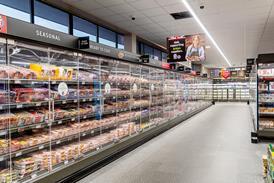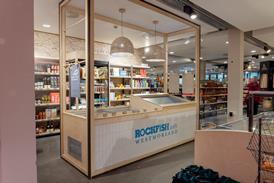
Top story
Poor weather and a significant drop in inflation has dampened grocery sales growth, according to the latest grocery market share figures from NIQ.
Total Till sales at UK supermarkets slowed to 1.1% in the last four weeks ending 15 June 2024, compared to the growth 12.1% in the same period last year.
NIQ said this slowdown is largely due to wet weather in the early weeks of the month compared to almost four weeks of dry, sunny weather and an early June heatwave last year.
Meanwhile, another contributing factor to this comparison is that food inflation had just peaked at 14.6% this time last year.
Channel performance also felt the impact of the wet days as shoppers were more inclined to shop for groceries online rather than in the stores. In the last four weeks, in-store sales were down 0.9% while there was an increase 3.7% in online sales, boosting the channel’s share of fmcg sales to 12.6%.
On an individual retailer basis, Lidl was the fastest growing supermarket with 12-week sales growth of 8% while Aldi fell back 1% from having the highest growth of any retailer last year.
Over the last 12 weeks Ocado (up 12.6%) continues to outperform all retailers and M&S (up 7.1%) also gained market share.
Sales at Sainsbury’s (up 4.7%) and Tesco (up 4.1%) also increased which saw the retailers also gain market share. Whilst Morrisons’ market share is down slightly to 8.4%, the retailer’s sales were up 1.4% in the period and has seen an 8% increase in fmcg spend per visit over the last 12 weeks.
Asda still has the weakest performance, with sales down 4.9%.
Mike Watkins, NIQ’s UK Head of Retailer and Business Insight, said: “The grocery sales uplift in June compared to May was much softer than this time last year which had the hottest June on record. Whilst the growth trends through to mid June look stark, we can now expect a lower level of growth for a number of months to come as we cycle through high inflation comparatives. We remain hopeful that current warm weather and England’s success at the Euros may boost sales of drinks and snacks.”
“Now that discounter market share has plateaued, their growth for the rest of the year will be more dependent on new store openings and encouraging more visits. This will be needed to counteract some of the spend gained during the high period of inflation, which is now drifting back to supermarkets and may well continue over the next six months.”
Watkins concludes: “The year to date growth at the grocery multiples has slowed to 2.6% in terms of value and 0.8% in terms of unit/volume, and we expect this low growth to continue. This means that the volume trend is now going to be more important than value sales growth as an indicator of the current health of food retail over the next few months.”
Morning update
On the markets this morning, the FTSE 100 is broadly flat at 8,223.2pts.
Risers include DS Smith, up 6.8% to 393.4p, Naked Wines, up 3.2% to 63.4p and Nichols, up 3.1% to 1,026.8p.
Fallers include Associated British Foods, down 2.7% to 2,456p, British American Tobacco, down 1.9% to 2,462p and Wynnstay, down 1.8% to 381.2p.
Yesterday in the City
The FTSE 100 closed down 0.3% yesterday to 8,225.3pts.
Risers included Glanbia, up 4.9% to €19.20, McBride, up 4.1% to 140p, FeverTree, up 2.9% to 1,110p, Britvic, up 2.6% to 1,190p, Hilton Food Group, up 2.2% to 914p and THG, up 2% to 62.6p.
The day’s fallers included Just Eat Takeaway.com, down 4.5% to 980p, Nichols, down 3.3% to 996p, Ocado, down 3.2% to 281p, SSP Group, down 3.1% to 150.1p, Domino’s Pizza group, down 2.2% to 308.2p and PayPoint, down 1.9% to 635p.















No comments yet